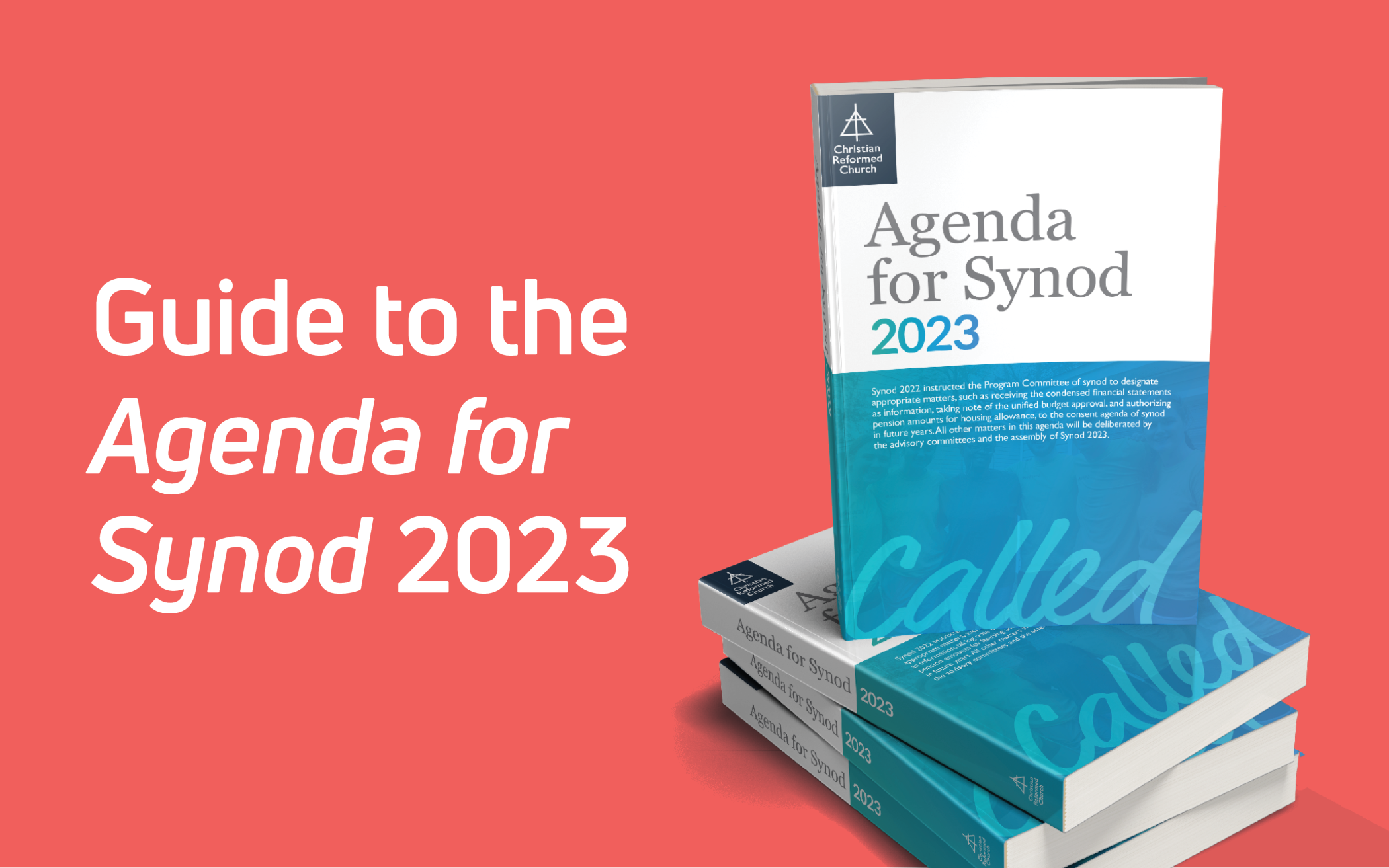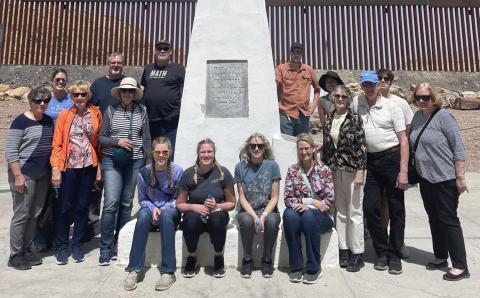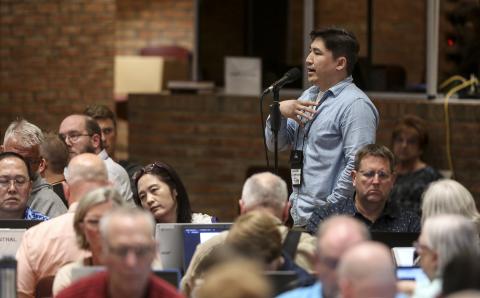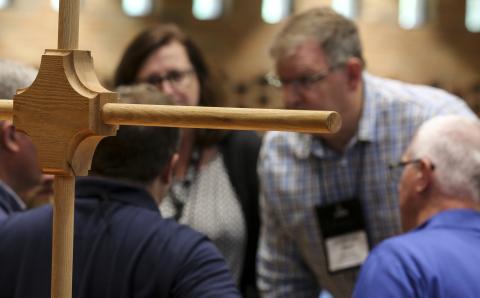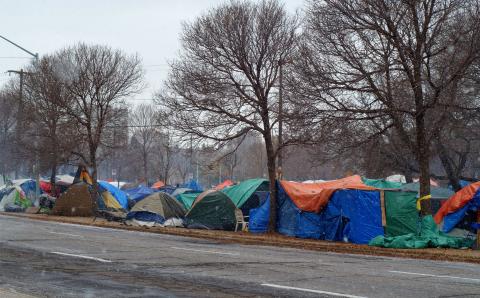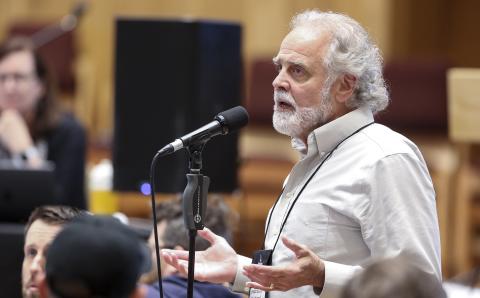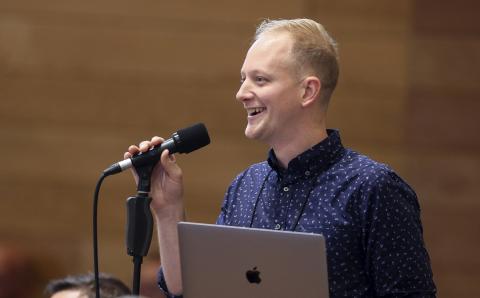NOTE: This is an updated version of the Guide originally published May 19. The update includes details from the Supplement to the Agenda for Synod 2023, released May 31 and updated June 1. To hone in on those edits, search for "supplement."
Synod 2023 might end up being remembered as the confessional alignment synod. Discussions will be dominated by issues around human sexuality. Many classes and churches are asking Synod 2023 to overturn the decision of Synod 2022 that declared that same-sex sex—and by logical extension, marriage—is included in the Heidelberg Catechism’s prohibition of unchastity, concluding it is therefore incompatible with the Christian Reformed Church’s confessional standards. Many other classes want Synod 2023 to not only keep the decision intact but also impose disciplinary measures on those acting contrary to the decision.
Not getting as much notice are two study committee reports: one on bivocational pastors and one on ecclesiastical (non-civil) marriage. Both of these reports were prepared a few years ago but are just now coming to synod due to COVID delays.
If trying to follow these issues and more through a 629-page agenda makes your head spin, welcome to The Banner’s guide to Synod 2023. We hope our 4,500-word guide gives you a good overview. If you want an even shorter summary, see “Synod 2023: What to Watch.”
We offer this guide, produced in collaboration with the CRC’s Office of Synodical Services, as a kind of life jacket to keep you afloat in a sea of words, rules, and practices.
As synod gets underway June 9-15 at Calvin University in Grand Rapids, Mich., The Banner’s award-winning onsite news team will bring you the facts of synod decisions, along with some history and context around synod’s deliberations. Find daily coverage at thebanner.org/synod, or download the Banner app on your mobile device.
Visit crcna.org/synod for the synod schedule, webcast (on a 20 minute delay), recordings, photos, committee reports, and liveblog.
As you read this guide, we hope you will find a new appreciation for this home we call the Christian Reformed Church. Please pray for all those participating in this year’s synod, whether as delegates, advisers, or staff, that they be blessed in worship and deliberations.
—Gayla R. Postma, retired Banner news editor
(supplement update by Alissa Vernon, current news editor)
Neland Avenue Christian Reformed Church
The Council of Delegates Report
Study Committees and Task Forces
Ecclesiastical Marriage Task Force (pp. 251-284)
Bivocational Task Force (pp. 285-314)
Our Shared Ministries and Synodical Committees
Ecumenical and Interfaith Relations Committee
New and Continuing Developments
(More) Overtures and Communications
Egalitarian or Complementarian
How to Use This Guide
This guide is a jumping-off point to the Agenda for Synod 2023. Noted page numbers apply to the printed Agenda, but the provided links will take you to the correct page of the online PDF of the Agenda.
The parts of the agenda that most synod-watchers focus on are as follows:
- the reports and recommendations from synod-appointed study committees and task forces
- the overtures (requests) coming from church councils, classes, and sometimes individuals (see Rules for Synodical Procedure, pp. 9-12)
If you want to know more about how synods operate and the rules that govern how we function together as a denomination, please see What is Synod?, Church Order, and The Delegates at th[1] e end of this guide.
Human Sexuality
Just like last year, discussion about human sexuality will dominate Synod 2023. This year’s synod will have to decide whether it will uphold and enforce last year’s decisions, overturn them, or do something different altogether.
Synod 2022 received the work of the Committee to Articulate a Foundation-laying Biblical Theology of Human Sexuality. Its report to synod, commonly known as the human sexuality report (HSR), affirmed the position that the church took in 1973 — that being same-sex attracted does not exclude someone from the community of Christ, but acting on that attraction is against obedience to the will of God as revealed in Scripture.
Most debated was Synod 2022’s decision to not only affirm that position but to declare that the prohibition against same-sex sex has confessional status. In the Acts of Synod 2022 on page 922, you’ll read that synod affirmed that the word “unchastity” in Heidelberg Catechism Q&A 108 “encompasses adultery, premarital sex, extramarital sex, polyamory, pornography, and homosexual sex, all of which violate the seventh commandment. In so doing, synod declares this affirmation ‘an interpretation of [a] confession.’ Therefore, this interpretation has confessional status.”
See also:
“Synod Declares Stance on Homosexual Sex ‘Confessional,” The Banner, June 15, 2022.
And there’s the rub. When officebearers of the CRC sign the Covenant for Officebearers, they agree to “promote and defend” the doctrines contained in the Heidelberg Catechism, as well as the Belgic Confession, and the Canons of Dort—the three forms of unity. Many officebearers have said they are now challenged by that.
Overtures, communications, and appeals (84 of them in the Agenda and five in the supplement) have poured in, and more than 80% are about Synod 2022’s decisions about human sexuality. Several of the overtures ask Synod 2023 to reverse Synod 2022’s decision declaring that same-sex sex is encompassed in the Heidelberg Catechism’s definition of unchastity. Eight of those were from classes meaning a majority of delegates from the classis congregations agreed to send the request. Another 13 came from individuals or councils after their classes declined to send their overture.
Eleven classes and a couple individual councils sent overtures supporting Synod 2022’s decision and want the decision enforced in various ways. Some overtures ask Synod 2023 to confirm that the decision will apply to not only officebearers in local congregations, but also to persons serving on various boards and committees of the denomination, and the faculty and staff of affiliated Calvin University, ensuring all denominational leaders remain in confessional compliance. (Calvin’s board is sending comments to some of those overtures, referred to synod by the Council of Delegates in Appendix E of the supplement.) Other overtures recommend that delegates who have not signed the Covenant for Officebearers without reservation should not serve synod as a delegate. There are a range of overtures asking for special discipline for church councils and classes that do not comply with Synod 2022’s decision.
See also:
“Calvin’s Board Votes to Retain Faculty Members Dissenting from Synodical Decisions,” The Banner, Nov. 3, 2022.
Gravamen/gravamina
A word that many Christian Reformed folks had never heard of now has become part of the church’s general lexicon: gravamen (gravamina, plural). The supplement to Church Order Article 5 describes two basic types of gravamina. One is a confessional difficulty gravamen. The officebearer expresses personal difficulty with a confession to the local church council but does not ask for a revision of the confession. In the current context, some officebearers are submitting gravamina regarding their difficulty with the decision of Synod 2022 giving confessional status to the church’s stance on same-sex relationships.
The other type is a confessional revision gravamen, used when an officebearer asks for a revision of a confession. A few church councils, as well as a group of one congregation’s members, have submitted overtures asking for a confessional revision that would revise the Synod 2022 interpretation of Heidelberg Catechism Q&A 108.
Last fall the Council of Delegates created a process by which delegates who are not ordained as officebearers can file a confessional difficulty under an exceptions policy. The exceptions policy was adopted in 2019, but no process was in place to file one. In Overture 57 (pp. 550-552), Classis Minnkota asks Synod 2023 to remove that process. It says the Council of Delegates executive committee does not have the authority to allow gravamen or confessional-difficulty exceptions. Under the “right to comment” policy, the Council of Delegates is sending its own response to Synod 2023, providing historical background of the exception process and explaining why the Council of Delegates executive committee does have authority to make such a policy. The response is Appendix B in the supplement.
See also:
“After Synod 2022: Discerning What Now,” The Banner, July 1, 2022.
Neland Avenue Christian Reformed Church
Speaking of confessional compliance, while the denomination is buffeted by the debate about same-sex relationships, Neland Avenue Christian Reformed Church in Grand Rapids, Mich., moved into the eye of the storm in 2020 when it installed as a deacon a woman in a same-sex marriage. (See Banner, “Woman in Same-sex Marriage Installed as Deacon,” Sept. 14, 2020.) Even prior to last year’s synodical decisions, Neland Avenue’s actions were widely seen as incompatible with the CRC’s position on homosexuality.
Synod 2022 ordered Neland Avenue to comply with the CRC’s position on same-sex marriage. (See “Neland Avenue CRC Ordered to Comply with Denominational Position on Same Sex Marriage,” The Banner, July 16, 2022.) And it tasked an in loco committee with bringing Neland Avenue into compliance.
Within days of Synod 2022’s adjournment, Neland Avenue announced it would appeal the decision to Synod 2023. (See “Neland Avenue CRC to Appeal Denomination’s Order,” Religion News Service, June 16, 2022.)
The in loco committee met with the Neland Avenue council and with representatives of Classis Grand Rapids East. The committee’s report to Synod 2023 (Agenda, pp. 317-348) noted that it was quickly apparent that Neland Avenue had no intention of rescinding its action of ordaining the deacon. And when Classis Grand Rapids East received the committee’s report, its meeting minutes noted that it received the work of the committee with gratitude and will wait for the results of Neland Avenue’s appeal to Synod 2023 before discerning any further action. (See “Grand Rapids East Thanks Synod’s Committee, Disagrees with Its Report,” The Banner, Jan. 27, 2023.)
Other classes have sent overtures to Synod 2023 about Neland Avenue. One wants the church council disciplined if it does not comply, another wants the council deposed, and another wants the entire classis dismantled with its congregations assigned to neighboring classes (Overture 65). That last action would be unprecedented. Classis Grand Rapids East is asking synod not to accede to it, changed its own articles of incorporation to be explicit about how the classis can be reconstituted (only at the request of a member congregation and with the approval of classis and synod), and lays out reasons the dismantling overture is out of order. (Overture 78, starting on p. 884 of the supplement.)
Another overture asks for discipline to be initiated for other congregations viewed to be out of line with the denomination's biblical requirements for officebearers. Neland and 10 other churches in six classes are named.
Synod 2023 has its work cut out for it.
The Council of Delegates Report
The Council of Delegates is the governance body that conducts the business of synod in between the annual meetings of synod. One delegate from each of the 49 regional groups of churches (known as a classis), plus a few at-large delegates, meet three times each year. The Council’s mandate is described more fully in the 2023 agenda, pp. 23-24.
The Council of Delegates report is where Agenda readers can really get bogged down. The report communicates to synod what the Council has done since the last synod, notes how it has responded to assignments from previous synods, provides a separate list of recommendations, and includes several appendices to explain the background to much of the above.
This Guide notes just a smattering of the work of the Council of Delegates. Following the links will leap-frog you through the Agenda from the reported actions, to the proposed recommendations, and further to the supporting appendices.
Code of Conduct
Synod 2019 instructed the Council of Delegates (Item H, 3) to draft a Code of Conduct to be signed by all ministry personnel employed by the denomination, by local churches, and by classes, as part of the denominational effort to prevent abuse of power in the church. In February 2022 the Council recommended the Code be used for all officebearers. Last year, Synod 2022 looked at it and sent it back to the churches for feedback, noting that “some of the language in the Code of Conduct is unclear and could be misinterpreted or misapplied,” and “the Code of Conduct does not adequately define terms such as power or abuse.” (See “Synod Wants Churches’ Feedback on Code of Conduct Before Implementing,” The Banner, June 16, 2022.)
Based on that feedback, the Council is bringing to synod a report from the review committee, found in Appendix A (pp. 54-73); a revised Code, Appendix A, Addendum A; and an FAQ document, Addendum B. A revised implementation plan for the Code is found in Addendum C. The proposed implementation of the Code of Conduct includes recommendations for revisions and/or additions to the Church Order and its Supplements. Changes to the Church Order require being proposed by one synod and adopted by a subsequent synod.
Six overtures ask Synod 2023 not to use the Code as a binding document.
The recommendations for adopting the revised Code are found on pp. 51-52, K, 1-4.
Racial Relations
Synod 2022 asked Calvin Theological Seminary to report on how they are teaching a biblical and Reformed perspective on issues of race and justice, and that classes be encouraged to ask all candidates for ministry about their commitment to preach a biblical and Reformed perspective on race and justice (Acts of Synod 2022, Article 81, Recommendation C-1, page 944). The seminary’s response is posted at crcna.org/CTS-Teaching-on-Peace-and-Justice.
The Council of Delegates also asked the general secretary to facilitate a “One Family Conversation” to focus on the key role that ethnic diversity is playing in the current and future reality of the CRCNA, and how classes have an important role to play in listening and supporting the growing diversity in congregational leadership. The plan for this conversation is included as Appendix E. Appendix K, Communication on Racism and Biblical Justice, is included in the supplement and a report from the general secretary on best practices for pursuing unity is in Appendix L of the supplement.
Congregational Ministries
Synod 2022 heard that plans were underway to reorganize the CRC’s Congregational Ministries, merging all nine ministries into one ministry agency. The vision, mission, and mandate for the new agency (not named in that document but since announced as “Thrive”) are found in Appendix D on pp. 77-79 of the Agenda. Congregational ministries include safe church, chaplaincy and care, social justice, race relations, faith formation, worship, disability concerns, diversity, and pastor church resources.
Synod 2023 is asked to conclude the synodical mandates and directives given to the previously separate ministries and instruct the new agency “to utilize these historical guidelines as valuable information for understanding synod’s intent regarding the desired denominational support for congregations.” The specific recommendations to synod are in P, 1-3, found on p. 53.
See also:
“Congregational Ministries Merge into One Agency with Two Co-leaders,” The Banner, Oct. 19, 2022.
“New Agency to Help Congregations Thrive,” CRC Communications, May 8, 2023.
Ministry Shares
Synod 2022 asked the Council of Delegates “to examine congregational responses to Ministry Shares Reimagined, with particular attention to questions such as the following: Why are ministry share contributions declining, especially in the U.S.? How are churches contributing in alternate ways? What other ministry priorities are congregations funding? What should we be doing going forward?” (Acts of Synod 2022, article 35, p. 846)
A full report coming to Synod 2023 via the Agenda Supplement, Appendix M includes these recommendations:
- Make the pledge process cycle be more flexible, allowing churches to make a pledge that best aligns with their budget process.
- Determine a base amount that covers core denominational costs, with a minimal pledge amount requested of each congregation based on the size of the church. In addition to the base amount, churches will be invited to pledge additional funding in support of the shared ministry (agencies and institutions) of the CRCNA.
- Provide more information on pledges and giving results to the churches and classes. Additional information will be shared with all churches regarding the level of support that has been pledged and received for the core cost and the shared ministries.
Speaking of money, for those who can read financial statements, you can find the condensed financial statements for 2022/2023 on pp. 83-111 (Appendix F).
Study Committees and Task Forces
Synod regularly appoints committees to study a particular issue and then make recommendations to a subsequent synod on actions to be taken. At any given time there could be two or three such committees working with specific mandates. There are two study reports coming to Synod 2023, both deferred from 2021 because of the COVID-19 pandemic.
Ecclesiastical Marriage Task Force (pp. 251-284)
Synod 2019 appointed this task force to study the advisability, legality, and morality of ecclesiastical (non-civil) marriage. The recommendations from the task force (pp. 276-277) include strongly advising pastors of the CRC not to solemnize ecclesiastical (non-civil) marriages and cautioning pastors against offering legal advice, but rather to advise couples to seek independent legal counsel as necessary.
(See also Roxanne Van Farowe’s summary “Don’t Sanction Marriages without the State, Report Urges,” The Banner, Nov. 25, 2020.)
Bivocational Task Force (pp. 285-314)
Synod 2019 appointed this task force to explore the challenges and opportunities for pastors who hold more than one job. The recommendations of the task force start on p. 309. (See also Clay Libolt’s summary “Report Calls the CRC to Catch Up with Trend of Pastors Holding More Than One Job,” The Banner, Nov. 25, 2020.)
Our Shared Ministries and Synodical Committees
In the 2023 agenda, the reports of the ministry agencies and institutions start on pp. 113-194. This is where you can read about what all the people in these ministries and schools are doing to further the kingdom of God on your behalf.
The reports are grouped around the themes of the denomination’s five callings: faith formation, servant leadership, global mission, mercy and justice, and gospel proclamation and worship. You can find links to the web pages of all the ministries at crcna.org. Each month the print issue of The Banner contains eight pages that share stories of these ministries (and they’re collected at thebanner.org/our-shared-ministry). CRC Communications shares even more stories on the CRCNA website.
Standing Committees
Besides the report from the Council of Delegates, there are also reports from each of synod’s three standing committees: Candidacy, Ecumenical and Interfaith Relations Committee, and the Historical Committee.
Candidacy Committee
The Candidacy Committee ensures that all persons entering ministry in the CRC meet the proper requirements. Whether a prospective pastor comes from Calvin Theological Seminary, another seminary, another denomination, or is entering ministry as a commissioned pastor, this committee, with the approval of synod, keeps expectations consistent. You can find the committee’s full report on pp. 197-202.
The report notes the changes in candidacy requirements made last year to align with changes to the master of divinity curriculum of Calvin Theological Seminary, including modifications to the biblical language requirement and the preaching requirement.
The committee has also been involved in significant efforts to provide theological education to Latino leaders. Calvin Theological Seminary is in the process of forming a master’s program entirely in Spanish (pp. 201-202). The committee is presenting 30 candidates for ministry, named on p. 829 of the supplement.
Ecumenical and Interfaith Relations Committee
The annual report from this committee (pp. 203-216) reminds us that the CRCNA is just a small part of the church worldwide. The CRC has two levels of relationships with other denominations, the closest being churches in communion, which includes welcoming each other’s pastors into the pulpit, among other things. The second is the category of churches in cooperation that recognizes all the other bilateral relationships the CRC has with other Christian churches. The CRC, through this committee, also participates in many ecumenical organizations.
New and Continuing Developments
The World Council of Churches: Although in 1950 and later the membership in the WCC was discouraged by synods, the committee reports that the ecumenical engagement of our denomination has evolved considerably. Last September, the chair of the EIRC attended the 11th Assembly of the WCC in Germany and shared his observations (pp. 209-212). On page 212 there is a list of pros and cons about joining the WCC, and recommendation D notes that a formal recommendation regarding membership will come to a subsequent synod. More information on this can be found in Appendices A and B (pp. 214-216).
The Alliance of Reformed Churches is the largest group of churches that have left the Reformed Church in America. The EIRC recommends that synod recognize the Alliance as a church in cooperation, leading toward the church in communion relationship. The EIRC also recommends that congregations and officebearers with previous CRC/RCA dual affiliation will maintain that affiliation. Recommendations for both of these matters are found on pp. 213-214, D-F.
(More) Overtures and Communications
Even though matters of human sexuality might be the dominant discussions in the public eye, churches and classes are raising other weighty topics for discussion.
Egalitarian or Complementarian
Overture 1 (pp. 352-353): Classis Niagara wants future synods to refrain from reading repetitious notes at the beginning of synod. Classis Niagara is not referring to the annual announcements about media policy and where the bathrooms are located. Classis Niagara specifically has in mind the note the delegates from Classis Minnkota add to their credentials each year, stating for the record that they protest the seating of women delegates at synod for reasons of conscience. The Christian Reformed Church has said that allowing women to be ordained (egalitarian) and not allowing it (complementarian) each are valid interpretations of Scripture. Classis Minnkota is complementarian. Classis Niagara wants synod to say that it doesn’t need to keep hearing the complementarian position articulated year after year and that it is causing harm to female delegates to synod.
Assisted Suicide
Overture 2 (pp. 354-356): Classis Zeeland asks synod to make a statement on assisted suicide. The overture notes that, according to recent opinion polls, assisted suicide is morally acceptable to 55% of Americans, and that 77% of Canadians consider access to assistance in dying a basic right. Classis Zeeland says that in the absence of a definitive statement from the church, members can “easily default to popular thinking.”
The CRC in Canada has been involved with end of life issues since 1980. Synod 1997 asked that the CRC’s Committee for Contact with the Government (in Canada) prepare a report, which can be found at crcna.org/synodresources by scrolling down to “Reports: End of Life Issues (2000).” You can find Synod 2000’s response and recommendations in Acts of Synod 2000, Article 59. Synod 2000 sent sections of the report with some edits as pastoral advice to churches, and it urged churches to implement some of the guidelines found in the report. It declined to appoint an official synodical study committee as had been recommended.
More recently, the CRC’s Centre for Public Dialogue (Canada) has compiled information on Canada’s legislation for medical assistance in dying. You can find a summary of its work to date, resources and information, worship suggestions, and the brief sent by CRCNA Canada to the Parliamentary Committee studying the legislation on the Centre for Public Dialogue’s webpage.
Ecclesiological Communication
Overture 3 (pp. 356-358): Classis Southeast U.S. says the CRC has “veered away from focusing on theological principles set within the context of the day,” and toward “promoting stances on specific economic, political, and social biases with little or weak scriptural support.” And the classis wants that to end. It asks Synod 2023 to declare that “the CRCNA will take no position, make no statements, and take no actions promoting or endorsing any social, economic, or political idea or action in any way, including but not limited to, written comments made in print or on our website, or by providing links from our website.” It wants a denominational committee established to enforce the declaration, stating that “some of the calls to social action that are seen in our publications often seem to be politically motivated with minimal or weak scriptural engagement—or worse, exhibit sophistry that impugns basic Christian doctrine.”
It is not the first time a synod has been asked to restrict communications from agencies, in particular the Office of Social Justice. Most recently in 2018, two classes asked synod to instruct the ministry agencies to “refrain from political advocacy” and “stop political lobbying” on behalf of the CRC. That year, synod instructed the Council of Delegates to create a U.S. committee to provide guidance and support to the Office of Social Justice. (See “Synod 2018 Creates New Justice Committee,” The Banner, June 14, 2018.)
The Council of Delegates, having received comments on this overture from World Renew, congregational ministries, and Justice and Reconciliation Ministries (Canada), has forwarded them to synod as information for the advisory committee dealing with this overture. Resonate Global Mission’s response to this overture is provided in Appendix F of the supplement.
Revise the Belgic Confession
Overture 15 (pp. 403-404), officially submitted as a confessional revision gravamen see section on that above): Classis Alberta South/Saskatchewan wants two changes to the Belgic Confession. Written in 1566, the Belgic Confession notes in Article 18, “the heresy of the Anabaptists who deny that Christ assumed human flesh from his mother” and in Article 34, “the error of the Anabaptists who are not content with a single baptism once received.” The classis requests that in both those articles, the words “the Anabaptists” be replaced with “those,” because these errors are not exclusive to Anabaptists.
What is Synod?
Synod is the annual leadership meeting, or general assembly, of the CRC. It is the broadest authority in the denomination. It is a deliberative body, not a representative body. In other words, delegates are sent by their classes not to represent particular views but rather to walk in the Spirit, pray, consider Scripture, and deliberate with others to find the will of the Lord as best they can.
Synod meets annually in June, usually in Grand Rapids, Mich. Each of 49 classes (regions) are invited to send four delegates to synod, where they will learn, celebrate, and make decisions about matters that concern the denomination.
For a few more details about how synods operate, see “Synod: What It Is and How it Works,” The Banner, May 13, 2022.
Church Order
The Rules for Synodical Procedure govern how synod is run. Delegates and leaders are also guided by the Church Order, the rule book, so to speak, that governs the denomination, its classes, and its congregations. Christian Reformed congregations have all covenanted together to follow these rules, making decisions in good and decent order. The rules were made over the years, adjusted after deliberation by previous synods and described through the included supplements. Changes to the Church Order usually require two synods to act (with the exception of its supplements, which do not require approval of the subsequent synod). One synod can propose a change, but a subsequent synod must adopt any change judged by synod to be substantial before it is enacted. (The Church Order is also available in Spanish and Korean. You can find these translations in the Synod Resources section of the CRC’s website.)
The Delegates
The agenda lists the delegates to synod from all the various classes, starting on page 15. You can see who is coming from your classis and pray for all of them. You’ll also see several blank lines, noting that classes could not find people willing to be delegated or to be alternates. All the more reason to be thankful for all those participating.
Synod 2023 is meeting June 9-15 at Calvin University in Grand Rapids, Mich. Find daily coverage from The Banner news team at thebanner.org/synod. Visit crcna.org/synod for the synod schedule, webcast, recordings, photos, committee reports, and liveblog. Synod is the annual general assembly of the Christian Reformed Church.
About the Authors
Gayla Postma retired as news editor for The Banner in 2020.
Alissa Vernon is the news editor for The Banner.

